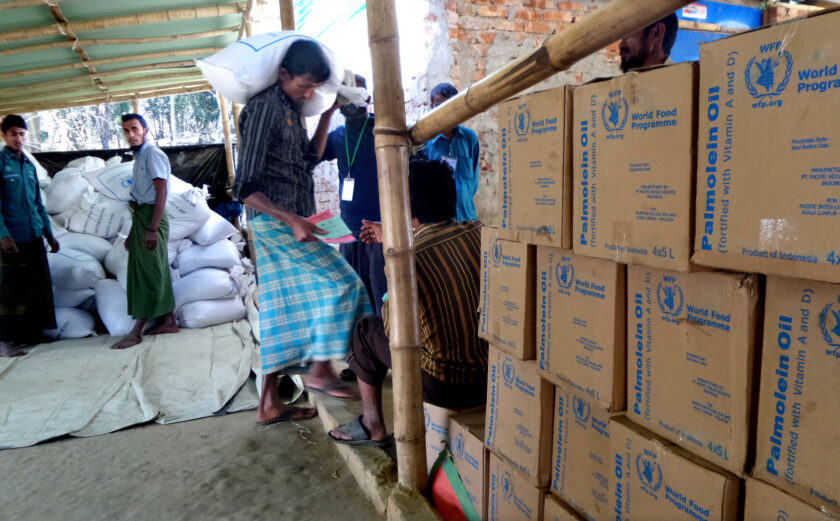
New OFAC Licenses Facilitate Humanitarian Transfers: Op-Ed by InterAction’s Andrea Hall
This article was first published in ACAMS Today
What began as a series of puzzling anecdotes about the inexplicable and abrupt closure of nongovernmental organizations’ (NGOs’) bank accounts has ballooned into the global phenomenon known as bank “de-risking”—where financial institutions (FIs) shed, rather than manage, any perceived risk in line with a risk-based approach. Its prevalence and impacts on NGOs have been well-documented.
It is both the stuff of dystopian fiction—Margaret Atwood’s book The Handmaid’s Tale describes the protagonist’s loss of her bank account as the harbinger of a frightening new world order—and the reality in which NGOs must operate.
With a new set of authorizations for NGO activities and transactions from the U.S. Department of the Treasury’s Office of Foreign Assets Control (OFAC), that narrative is poised to change. These general licenses pave the way for FIs to comfortably facilitate international funds transfers for humanitarian aid, development and peacebuilding work in some of the world’s most complex settings. The general licenses, which authorize a range of activity in 29 sanctions and counter-terrorist designation regimes—including Darfur, Lebanon, Somalia and Yemen—are self-executing, meaning anyone can use them without the need for an application.
“Put simply, the new general licenses are a game changer for humanitarian organizations working in places where listed entities are present,” said Kate Phillips-Barrasso, vice president for global policy and advocacy at Mercy Corps. “They are an unequivocal policy statement by the U.S. government that humanitarian action is allowed despite sanctions and represent a major step forward in addressing the obstacles faced by organizations working to save lives in these countries.”
How We Got Here
The new general licenses are the product of years of NGO advocacy, two multistakeholder dialogues in the U.S. along with others around the world, a multitude of reports, the passage of the Anti-Money Laundering Act of 2020 (AMLA), the designation of the Houthis in Yemen (later reversed) as a foreign terrorist organization (FTO), the U.S. Department of the Treasury’s review of its sanctions programs7\ and more recently, a robust collaboration between government and the NGO sector.
While account closures and the similar problem of account refusals persist, they have been overshadowed by widespread delays or cancellations of international funds transfers. Delays typically last weeks or even months, significantly postponing or canceling lifesaving NGO programs. In one often-cited example, an NGO winterization program in rural Afghanistan was canceled, as the program funds were received by the NGO’s local partners after winter had concluded.
As noted in a 2017 empirical study, “When programs are delayed or canceled because of the inability to transfer funds, peace is not brokered, children are not schooled, staff is not paid, hospitals lose power, the needs of refugees are not met and, in the worst cases, people die.”
When NGOs first alerted the Department of the Treasury almost a decade ago about their account closures, the Department of the Treasury was reluctant to interfere in what they viewed as business decisions. However, it became apparent that the problem was much broader, and subsequent reports, including two from the U.S. Government Accountability Office (GAO) and a multistakeholder dialogue convened by the World Bank and ACAMS, posited that among the likely drivers of de-risking was U.S. government regulation and policy around sanctions and terrorist designations.
In the waning days of the previous administration, there were two events that impacted de-risking in the banking industry. First, the U.S. Department of State designated Ansarallah (also known as the Houthis) in Yemen as an FTO. This specific terrorist designation is controlled by the Department of State, which does not have the legal authority to license NGO activities as the Department of the Treasury does with the sanctions and designations that it administers. NGOs that must engage with FTO-designated groups to access populations in need are, therefore, at risk of criminal prosecution under the federal prohibition on providing material support to terrorists. While the designation itself caused many NGOs to pause their aid operations in Yemen, leaving aid beneficiaries without lifesaving support, it also offered an opportunity for NGOs to engage U.S. government officials on the difficulties of providing aid in contexts such as Yemen, where an FTO is the de facto governing authority for most or all of the country.
In the first few weeks of the Biden-Harris administration, Secretary of State Anthony Blinken reversed the FTO designation of the Houthis to “ensure that relevant U.S. policies do not impede assistance to those already suffering what has been called the world’s worst humanitarian crisis.”
Second, Congress passed the AMLA, a portion of which spoke directly to bank de-de-risking of charities. The law directed the Department of the Treasury to review its existing regulations and guidance to identify the likely drivers of de-risking and to develop a “de-risking strategy.”
In January 2021, the White House issued National Security Directive 1, charging federal agencies to examine how sanctions impeded the response to COVID-19 abroad. Department of the Treasury Secretary Janet Yellen also directed her agency to thoroughly examine all sanctions programs. The Department of the Treasury’s 2021 sanctions review outlined a new framework to modernize sanctions and stated, “Treasury must address more systematically the challenges associated with conducting humanitarian activities through legitimate channels in heavily sanctioned jurisdictions. Where possible and appropriate, Treasury should expand sanctions exceptions to support the flow of legitimate humanitarian goods and assistance and provide clear guidance at the outset when sanctions authorities are created and implemented, particularly related to vulnerable populations.” These events marked the beginning of a sea change in the way the U.S. government engages with the NGO sector, creating a collaborative environment where positive changes can occur.
In December 2022, the U.S. and Ireland introduced a resolution at the United Nations (U.N.) Security Council to create a humanitarian carve-out in all U.N. sanctions regimes. UNSCR 2664 passed on December 9, and two weeks later, the U.S. became the first country to implement the resolution when it issued or amended general licenses “to ease the delivery of humanitarian aid and ensure a baseline of authorizations for the provision of humanitarian support across many sanctions programs.” Going forward, these carve-outs will apply to all new sanctions regimes.
What Is Authorized?
These new general licenses are a huge step forward in solving a complex problem that will require a multifaceted solution. They provide authorizations in four categories:
- The official business of the U.S. government
- The official business of certain international organizations and entities, such as the U.N. or the International Red Cross
- Certain humanitarian transactions in support of NGOs’ activities, such as disaster relief, health services and activities to support democracy, education, environmental protection and peacebuilding
- The provision of agricultural commodities, medicine and medical devices, as well as replacement parts and components and software updates for medical devices for personal and noncommercial use
The authorizations include noncommercial activities designed to directly benefit the civilian population that fall into one of the following categories:
- Humanitarian projects to meet basic needs, including disaster, drought and flood relief; food, nutrition and medicine; health services; and services for vulnerable or displaced populations
- Democracy building, including the rule of law, citizen participation, government accountability and transparency, human rights, access to information and civil society development projects
- Education, including combating illiteracy
- Noncommercial development projects
- Environmental and natural resource protection
- Peacebuilding, conflict prevention, conflict resolution, and disarmament, demobilization and reintegration programs
The general licenses for NGOs also permit fund transfers to sanctioned or designated entities for the payment of taxes, fees, import duties or the purchase or receipt of permits, licenses or public utility services. These include authorizations for both the Global Terrorism Sanctions and the Foreign Terrorist Organization Sanctions Regulations. General licenses for the official business of the U.S. government authorize all transactions.
Due Diligence and Risk Mitigation Are Here to Stay
Both the U.S. government and NGOs have made it clear that these new licenses are not a blank check, and they will not change the way NGOs do their part to prevent sanctions violations and terrorist financing. As one U.S. government official stated off the record, “Risk mitigation is here to stay.” NGOs resoundingly agree.
Humanitarian aid, development and peacebuilding communities have a vested interest in protecting their donors, partners and the populations they serve, as well as their own resources. Consistent with the humanitarian principles of humanity, neutrality, impartiality and independence, humanitarian NGOs are committed to ensuring that aid reaches its intended beneficiaries. These organizations have worked diligently for decades to establish policies and processes that mitigate or prevent—to the maximum extent possible—aid diversion, manipulation and interference from state and non-state actors, including sanctioned or other designated entities.
Their risk management and due diligence systems have been adapted to different contexts in which they operate to address the specific threats they face. These include but are not limited to appropriate beneficiary selection processes, accountability measures, internal and external reporting, monitoring and controls on the use of funds, awareness raising on the risk of terrorist financing, third-party screening, internal audits and investigations mechanisms. Some of the mechanisms implemented by NGOs to prevent the diversion of funds to terrorists or other sanctioned actors include risk management procedures, ethical codes of conduct, incident reporting systems, dedicated policies on counterterrorism measures, screening and vetting procedures, double validation on all purchases and payments, and whistleblowing and complaint mechanisms.
Looking Ahead
There is more on the horizon. With the release of its de-risking strategy, the Department of the Treasury hopes to harmonize bank examinations with its policy statements on de-risking, among other changes.
FIs will also have the opportunity to participate in a new round of the U.S. multistakeholder dialogue, set to restart sometime this year. This forum provides an opportunity for all three stakeholder groups—FIs, NGOs and the government—to help each other understand the constraints under which each operates and to brainstorm solutions. All stakeholders have a shared interest in facilitating aid where it is needed most. Through robust participation, that goal can become a reality.
As FIs work toward operationalizing the new OFAC general licenses, Phillips-Barrasso notes, “It is essential that financial service providers see this clear signal and work with humanitarian organizations to ensure that they are able to access the resources needed to run programs, procure goods and pay their staff.”
_
This was first published in ACAMS Today. All citations can be found in the original posting.







